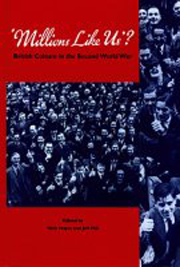Book contents
- Frontmatter
- Contents
- List of Figures and Tables
- Notes on Contributors
- Acknowledgements
- An ‘English War’, Wartime Culture and ‘Millions Like Us’
- British Cinema and ‘The People's War’
- The People's Radio: The BBC and its Audience, 1939–1945
- Was it the Mirror Wot Won it? The Development of the Tabloid Press During the Second World War
- A More Even Playing Field? Sport During and After the War
- A Time for Hard Writers: The Impact of War on Women Writers
- Safe and Sound: New Music in Wartime Britain
- More Than ‘Music-While-You-Eat’? Factory and Hostel Concerts, ‘Good Culture’ and the Workers
- ‘When Work Is Over’: Labour, Leisure and Culture in Wartime Britain
- Not Just a Case of Baths, Canteens and Rehabilitation Centres: The Second World War and the Recreational Provision of the Miners' Welfare Commission in Coalmining Communities
- ‘You and I – All of Us Ordinary People’: Renegotiating ‘Britishness’ in Wartime
- Postscript: A War Imagined
- Index
Not Just a Case of Baths, Canteens and Rehabilitation Centres: The Second World War and the Recreational Provision of the Miners' Welfare Commission in Coalmining Communities
- Frontmatter
- Contents
- List of Figures and Tables
- Notes on Contributors
- Acknowledgements
- An ‘English War’, Wartime Culture and ‘Millions Like Us’
- British Cinema and ‘The People's War’
- The People's Radio: The BBC and its Audience, 1939–1945
- Was it the Mirror Wot Won it? The Development of the Tabloid Press During the Second World War
- A More Even Playing Field? Sport During and After the War
- A Time for Hard Writers: The Impact of War on Women Writers
- Safe and Sound: New Music in Wartime Britain
- More Than ‘Music-While-You-Eat’? Factory and Hostel Concerts, ‘Good Culture’ and the Workers
- ‘When Work Is Over’: Labour, Leisure and Culture in Wartime Britain
- Not Just a Case of Baths, Canteens and Rehabilitation Centres: The Second World War and the Recreational Provision of the Miners' Welfare Commission in Coalmining Communities
- ‘You and I – All of Us Ordinary People’: Renegotiating ‘Britishness’ in Wartime
- Postscript: A War Imagined
- Index
Summary
The impact of the Second World War on social change has long been a subject of much controversy. The centre of debate has, however, recently moved from perennial favourites, such as the role of women or the nation's health, to the People's Culture: the effect of the war on popular leisure, recreation, the arts and lifestyles generally. Did the war, for example, cause ‘people to be favourably disposed to “improving” pastimes’, a people's culture for a people's war, which quickly reverted to what Priestley characterized as the ‘silly, passive-style amusement’ of peacetime? Alternatively, is the judgement of Pat Kirkham and David Thoms that wartime disruption‘ensured that British society and culture were fundamentally altered by the experience of war’ convincing? These are large questions that will not be addressed in the round here. Rather the spotlight will focus on a single actor in the wider drama of events: the recreational provision and activity of the Miners' Welfare Commission (MWC), financed by a fund raised through levies on coal output with a remit to provide improvements in the ‘social well-being, recreation and conditions of living’ in mining communities. The recreational provision of the MWC is a highly appropriate site to address the impact of the conflict of 1939–45, because it was a unique experiment in state initiated and sponsored welfare provision in a private-sector industry which served the needs of one of the most significant sections of the working class from 1920 into the era of coal industry nationalization.
- Type
- Chapter
- Information
- Millions Like Us?British Culture in the Second World War, pp. 261 - 294Publisher: Liverpool University PressPrint publication year: 1999



